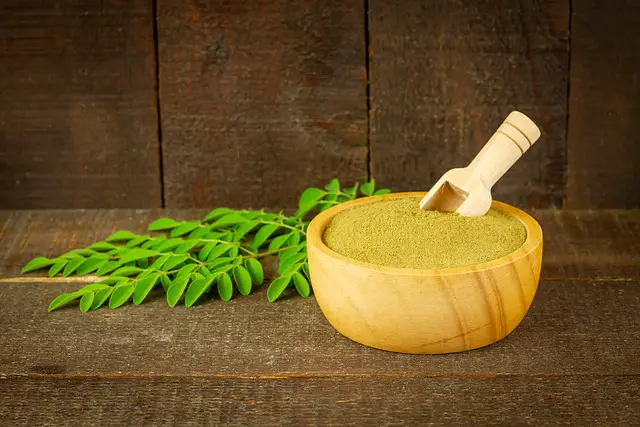Exploring the Impact: How Moringa Benefits Liver Health and Function
Do you know that the liver is an organ for detoxification, fat metabolism, and nutrient absorption? But what if the liver is damaged? This is where Moringa, often hailed as a “superfood,” offers a promising array of benefits for liver health.
From its antioxidant prowess shielding against oxidative stress to anti-inflammatory properties soothing the liver’s terrain, Moringa unfolds as a botanical ally in the pursuit of a healthy liver. Its leaves are best known for stabilizing the liver enzymes and bringing them back to their original functioning ability.
Let me first give more background of the liver and its vital role in the body.
The liver acts as a filter as it eliminates harmful substances from our body and provides a healthy supply of blood to the body. It’s is a key factor in blood clotting, eliminating excess glucose, bile production, etc. It can only function properly when the enzyme levels are normal. A damaged liver can pose significant health risks, such as incomplete digestion, hormonal imbalance, brain fog, etc. The liver’s role in detoxification, metabolism, and immune function underscores its significance, making exploring natural allies that can fortify its resilience imperative. This is where Moringa comes in.
Moringa is a holistic health booster packed with essential vitamins, minerals, and amino acids. Its potent antioxidants neutralize harmful free radicals, reducing oxidative stress on cells. Additionally, the anti-inflammatory compounds in Moringa play a role in overall health by mitigating inflammation.
Whether in the form of leaves, powder, or oil, incorporating Moringa into your routine can be a simple yet effective way to tap into its potential health benefits, supporting your journey to a healthier lifestyle. So, let’s get into the details and learn about Moringa’s effects on the liver.
Growing Popularity of Moringa as a Health Supplement
Modern people are more conscious of their health and prefer natural herbal products as remedies due to their lesser side effects. Also known as the “drumstick tree” or “horseradish tree,” it has been used as a food and a source of alternative medicinal therapy.

Moringa is readily available, digestible, and a cheap source of nutrition. Busani et al. reported that the vitamins and minerals present in Moringa are beneficial for improving immunity against certain diseases. It contains a wide range of macro- and micronutrients and bioactive compounds essential for the human body and overall health.
Moringa is available in many forms, such as medicinal coated capsules, drinks, tea, etc.
If you’re interested to learn more about the benefits of Moringa tea and how it boosts your immunity, you can check out the article below:
Benefits of Moringa Powder for the Liver
Moringa powder is celebrated for its potential benefits for liver health, offering a natural and nutrient-rich supplement that may support various aspects of liver function. Here are the key advantages of consuming Moringa powder to improve liver health:
1. Antioxidant Protection
Moringa powder contains antioxidants like quercetin, chlorogenic acid, and beta-carotene. These antioxidants help combat oxidative stress in the liver, shielding it from free radical damage and promoting overall liver health.
2. Anti-Inflammatory Properties
Chronic inflammation can compromise liver function. Moringa powder contains anti-inflammatory compounds that may help mitigate inflammation, potentially contributing to the prevention of liver damage.
3. Detoxification Support
The liver plays a pivotal role in detoxifying the body. Moringa powder enhances the liver’s detoxification processes, removing toxins and supporting the liver’s overall cleansing abilities.
4. Liver Enzyme Regulation
Studies suggest that moringa supplements may contribute to the regulation of liver enzymes, indicating a potentially positive impact on liver function and health.
Scientific Evidence: The Positive Impact of Moringa on Liver Health
Moringa, a versatile plant, has various forms, such as leaves, seeds, roots, and juice, that can be used for supplements and medications. While Moringa leaves and seeds offer nutritional benefits, caution is advised with the roots due to a nerve toxin called Spirochin. Despite potential dangers, Moringa roots have shown promise in certain medical applications, such as treating ovarian cancer.
Concerning liver health, Moringa’s positive effects are linked to its ability to combat damage induced by antitubercular drugs. Studies involving rats and guinea pigs demonstrated reduced liver fat build-up when Moringa was administered. Specifically, Moringa helped counteract lipid accumulation caused by antitubercular drugs, showcasing its potential in mitigating liver damage.

When used in appropriate amounts, Moringa demonstrated positive effects in preventing liver fat build-up. Moreover, using Moringa leaf extracts reduces liver function markers, especially AST. Lower levels of this enzyme are responsible for improving liver health and reducing hepatic cell damage.
It was reported that Moringa oleifera seed oil has the potential to protect against hepatitis induced by carbon tetrachloride.
While Moringa shows promise in alleviating liver disorders and preventing fat accumulation, it is crucial to exercise caution, especially with specific plant parts. Scientific research supports the potential benefits of Moringa for liver health, but further studies are needed to establish its efficacy and safety in different contexts.
Potential Hepatoprotective Effects of Moringa on Liver Health
The hepatoprotective effects of natural compounds and botanical extracts have garnered significant attention in the field of health and wellness. Among these, Moringaoleifera, commonly known as Moringa, has emerged as a plant with potential benefits for liver health.

In recent years, researchers have explored the hepatoprotective properties of Moringa, investigating its impact on liver function, antioxidant capacity, and the mitigation of liver-related disorders.
This section will delve into the current scientific understanding of how Moringa may contribute to liver health and its potential as a natural agent in supporting and protecting this vital organ.
Liver Protection and Healing
Multiple studies highlight the effectiveness of Moringa in reducing liver damage, protecting against hepatitis, and preventing fatty liver disease.
Enzyme Restoration with Moringa
Moringa can restore liver enzymes to normal levels, essential for blood detoxification, bile production, fat metabolism, and nutrient absorption.
Anti-Inflammatory Power of Moringa
Moringa’s potent anti-inflammatory properties greatly benefit the liver by reducing inflammation, supporting glucose metabolism, and promoting efficient bile production for improved digestion.
Oxidative Stress Reduction
Moringa is rich in antioxidants, which ultimately aid the liver in combating oxidative stress, which is crucial for maintaining proper liver function and detoxification.
Stress Reduction and Hormone Balance
Moringa’s anti-inflammatory effects are responsible for the smooth operation of the HPA axis, reducing stress and preventing severe damage to the liver associated with prolonged stress responses.
Potential Risk on the Liver From Consuming Too Much Moringa
The liver breaks down medicines in our body. Moringa can interfere with this process, making the liver unable to break down some drugs properly. This can be risky for our health. If Moringa affects how the liver works with medicines, it might cause problems.
People who take medications regularly need to be careful. Before adding Moringa to your diet, it’s essential to talk to your doctor. They can advise on whether consuming Moringa with your medicines is safe or not.
This way, you can make sure that using Moringa won’t cause any issues with your medications and that you stay safe and healthy.
Conclusion
Moringa exhibits promising potential for enhancing liver health in various forms due to its robust nutritional profile, encompassing antioxidants and anti-inflammatory properties. As a nutrition powerhouse, Moringa’s benefits extend beyond liver support.
Nevertheless, prudent consumption is imperative to mitigate potential side effects. Safely incorporating Moringa into one’s diet mandates caution, stressing the importance of consulting with a healthcare professional before commencement.
This precaution ensures individual safety and personalized guidance, underscoring the significance of informed decisions regarding Moringa intake for holistic well-being.

Tara is a nutrition enthusiast with a passion for superfoods like Moringa and pomegranate. She has over 10 years of experience as a professional writer and researcher and specifically covers topics around the health benefits of superfoods, and provides readers with valuable knowledge and insights.

